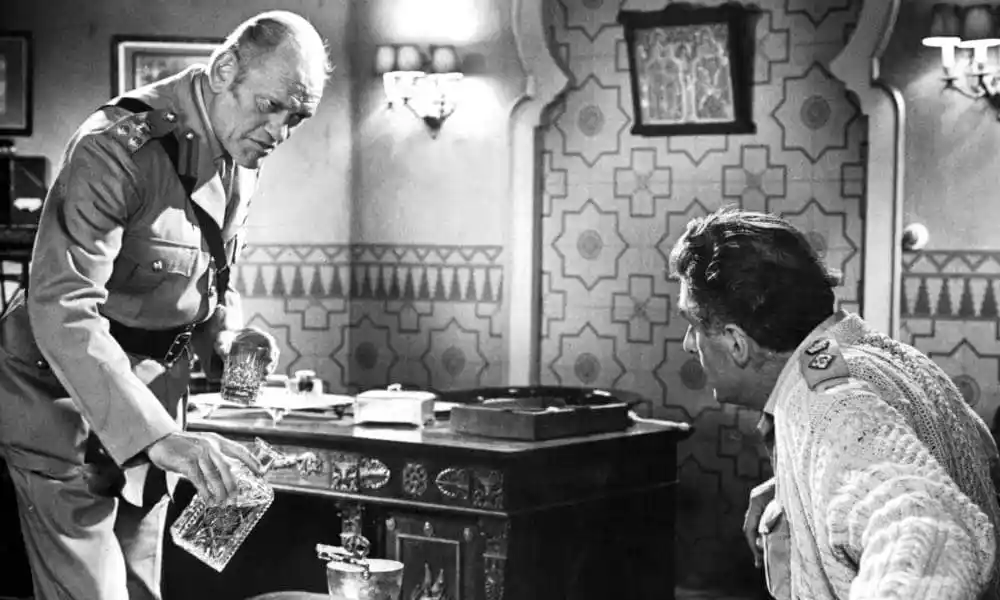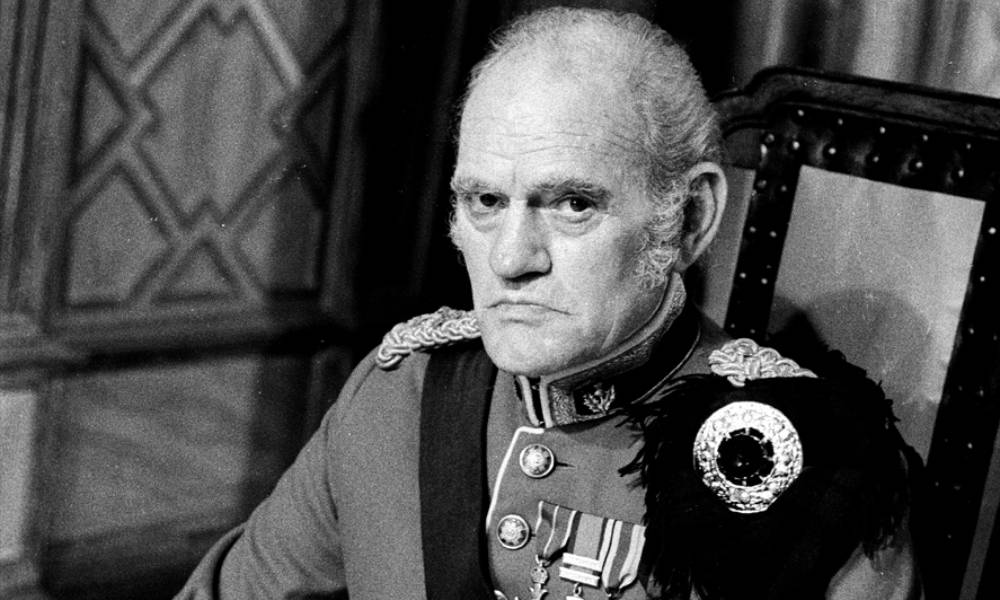British actor Harry Andrews on the set of the film ‘The New Spartans’ on June 01, 1975 in Derbyshire, England. (Getty/Anwar Hussein)
Journalist and author Tim Walker is reflecting on a poignant interview he had with British actor and cinema star Harry Andrews, who never went public about his sexuality or his relationship during his life.
Andrews was an established theatre actor who used his commanding presence and dashing looks to excel in tough military roles including The Red Beret, The Hill and Battle of Britain.
Beyond the tough exterior, Andrews was well-known for his work in dramas and comedy films. He appeared in such films as a 1970 film adaptation of Wuthering Heights, the film version of the musical Man of La Mancha and even played a Kryptonian elder in the 1978 film Superman.
Andrews did not reveal much about his private life to the public until he was interviewed by journalist Tim Walker. Though the actor never went public about his sexuality during his life, he did open up to Walker, who met Andrews and his long-term partner.
Sadly, Harry Andrews died on 6 March 1989 at his home in Salehurst, East Sussex and was buried next to his partner of 30 years and fellow actor Basil Hoskins.
In an extract from his book Star Turns, Walker recounts interviewing Andrews, meeting Hoskins and the “moral dilemma” he faced when deciding if he wanted to tell the world about the actor’s sexuality.
When I arrived at the home of Harry Andrews in the Sussex countryside, I was greeted at the door by his lover of the past 30 years, who led me into the living room where the ‘tough guy’ star of war films such as The Hill, The Red Beret and Battle of Britain was waiting with a pot of tea, a plate of biscuits and a broad, gap-toothed smile.
Andrews was one of those actors who possessed a face that was disproportionately more famous than his name. Years of appearing on the boards with Olivier, Gielgud and Richardson meant, however, that his status within his profession was assured.
This was the mid-1980s and Andrews had just landed a part in Dynasty, the hit television series that starred Joan Collins and John Forsythe. He was apprehensive. ‘They told me how many people tuned in to watch,’ he said. ‘It depresses me to think that more people will see me in just one episode of this than all of my stage work put together.’
He didn’t like the idea, either, that it might turn him into a ‘celebrity’. Andrews loathed the word, very rarely gave interviews, and had, in his younger days, turned down the chance of a Hollywood contract, supposedly because he’d baulked at having to pin back his much-too-big ears and change his much-too-forgettable name. This was an actor who had clearly made a conscious decision to be no more famous than absolutely necessary.
A factor in this may well have been the lover who had opened the door to me: Basil Hoskins, a popular character actor who had appeared in television series such as Emergency Ward 10, The Prisoner and also, with Andrews, the classic war film Ice Cold in Alex.

Andrews’ private life was no secret among his peers – the Oliviers would entertain him and Hoskins at their home in nearby Steyning – but he had never made any kind of public announcement about it, and no wonder because homosexuality had, for most of his career, been a criminal offence. The most Andrews had ever done was to hint at it in later life when he had accepted the part of an overtly gay character in the film version of Joe Orton’s Entertaining Mr Sloane.
Harry Andrews was great fun to talk to and he could not have been more easy-going, but professionalism was obviously what mattered to him more than anything. He spoke of his disgust that Marlon Brando, when he had appeared with him in a scene in Superman, insisted that ‘idiot boards’, with his lines written on them, were placed behind the cameras. ‘They were paying him millions of dollars for just a few days’ work and it’s not like he had that many lines to learn,’ he said. ‘I looked at Trevor (Howard) who was in the scene, too, and we both raised our eyes to the heavens.’
He felt Richard Burton, after marrying Elizabeth Taylor, had allowed his celebrity to get in the way of his acting, which he had a duty to put first. He admitted he had no time for actors who failed to appear on sets or stages on time: he expected them to be word-perfect, sober and ready to start.
In contrast to the characters he played on screen, Andrews detested war. ‘I saw close friends blown to bits beside me,’ he said. ‘No one who has been through that could find war glamorous.’ Still, he made it into the Queen’s Royal Kent Regiment, took part in the D-Day landings and was mentioned in despatches. He was also — ‘briefly’, he pointed out — promoted to the rank of major.
Peaceful pursuits, such as gardening, music and reading occupied the real Andrews’ time, and, as for the roles coming his way, he cheerfully conceded he’d cornered the market in ‘deathbed scenes’. He’d died in the television series Clayhanger, confided he was expected to slip the mortal coil, too, in Dynasty, and had most recently conked out in a show called Inside Story, in which he played a newspaper proprietor. He had several scenes with the former Prime Minister Harold Wilson in a cameo role. ‘I got on very well with his wife, but Wilson himself was very boring. All his conversations with me started: “Of course, when I was prime minister…”’
I hadn’t the slightest idea about Andrews’ sexuality until I’d arrived at his home — not a word even hinting at it had appeared up until then in the newspapers — but, at seventy-three, he obviously couldn’t be bothered to pretend any more. This posed a moral dilemma for me as an ambitious, young, local newspaper journalist: if I got into the issue at all in the interview, I knew there was a grim inevitability about what would ensue. The homophobia of the tabloids was virulent in those days because of AIDS, and the coverage of the last days of Rock Hudson — another Dynasty star — had been peculiarly tasteless and judgemental. Did I really want it on my conscience I had put not just Andrews, but also Hoskins, through a lot of lurid ‘gay secret’ headlines in their later years?
This was a scoop I decided I could do without, and, after my interview appeared — focusing on Andrews’ career — I received a handwritten note from him in which he’d described me as a ‘civilised interrogator’. He passed away peacefully four years later and was able to ‘come out’ on his own terms, and posthumously. In 2005, when Hoskins also died, he was, as Harry Andrews had asked, buried beside him in the graveyard at St Mary the Virgin in Salehurst, East Sussex.
Tim Walker is a journalist and author with a long Fleet Street career. Star Turns is his anthology of the decades of interviews he did with the world’s most famous actors and was published earlier this month by SunRise.
